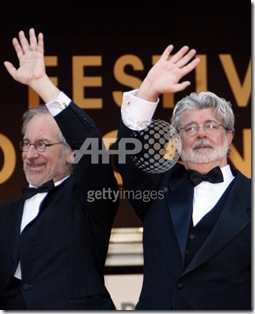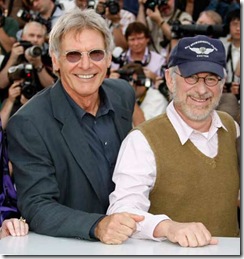Dos de los eventos más esperados del Festival se llevaron a cabo el día de hoy: El estreno mundial de Indiana Jones and the Kingdom of the Crystal Skull, y la reedición de la obra maestra de culto de Wong Kar Wai Ashes of Time.
En el caso de Indiana Jones, como era de esperarse, las reacciones son positivas, pero con ciertas reservas:
"One of the most eagerly and long-awaited series follow-ups in screen history delivers the goods -- not those of the still first-rate original, 1981's "Raiders of the Lost Ark," but those of its uneven two successors. "Indiana Jones and the Kingdom of the Crystal Skull" begins with an actual big bang, then gradually slides toward a ho-hum midsection before literally taking off for an uplifting finish. Nineteen years after their last adventure, director Steven Spielberg and star Harrison Ford have no trouble getting back in the groove with a story and style very much in keeping with what has made the series so perennially popular." -- Variety.
star Harrison Ford have no trouble getting back in the groove with a story and style very much in keeping with what has made the series so perennially popular." -- Variety.
"Crystal Skull is intended, and works effectively, as instant nostalgia — a class reunion of the old gang who in the '80s reinvigorated the classic action film with such expertise and brio. So don't expect the freshness of the what-one-man-can-do plot in Iron Man, or the oneiric visuals of Speed Racer. Spielberg and Lucas, and screenwriters David Koepp and Jeff Nathanson, are looking not forward but back, to the first three films." -- Time Magazine.
"So high was Indy fever in Cannes that the normally half-empty Lumiere cinema was packed, packed, packed, with a palpable air of excitement that resulted in an unprecedented burst of applause as the lights dimmed, followed by an impromptu sing-song of John Williams' famous theme. Well, the good news is that there was applause, and cheers, at the end too, which is pretty unusual at Cannes. Yes, there were a few boos, but there were always going to be, since Cannes critics are a tough crowd. Although it could never be the Indy film you dreamed of (when has a sequel of this pedigree ever delivered on the expectations of people who've had 19 years to obsess and fantasise about it?), this is NOT the Indy film you were dreading." -- Empire.
A la extrema derecha Wong Kar Wai, extrema izquierda su colaborador de siempre, el cinematógrafo Christopher Dolyle. En el centro los actores Charlie Young, Carina Lau y Tony Leung
Ashes of Times, una de las películas menos vistas del maestro Wong Kar Wai por su falta de disponibilidad en DVD en varias regiones y la mala calidad de sus subtítulos, se presenta en Cannes totalmente restaurada, remasterizada y con nueva musicalización:
“The film is still a formal wonder, as it was 15 years ago, full of Wong's signature step-printing technique, his off-kilter shooting angles and a flamboyant visual style that often produces something more like an abstract expressionist painting than a movie. But while it's hard to be definitive about what's different in the new version without comparing it shot by shot with the old, the music seems much more powerful and more fully keyed-in to the action, and the color is saturated and intensified to make the film even more stylized than it already was.” -- The Hollywood Reporter.
De la sección oficial, se exhibieron la italiana Gomorra de Mateo Garrone y Serbis, del filipino Brillante Mendoza.
De derecha a izquiera: El actor Toni Servillo, director Matteo Garrone, y los actores Maria Nazionale, Gianfelice Imparato y Salvatore Cantalupo.
Descrita como violenta y realista al extremo, Gomorra, una película basada en el bestseller mundial de Roberto Siavano sobre sus experiencias de primera mano con la mafia italiana, es hasta ahora [junto a Three Monkeys y Waltz with Bashir] una de las 3 contendientes más fuertes para la Palma:
"Powerful, stripped to its very essence and featuring a spectacular cast (of mostly non-professionals), Matteo Garrone's sixth feature film "Gomorra" goes beyond Tarrantino's gratuitous violence and even Scorsese's Hollywood sensibility in depicting the everyday reality of organized crime's foot soldiers. The characters of the film's five stories all work for the Camorra - the Neapolitan "mafia" behind over 4,000 murders in 30 years in Italy, and countless illegal activities - and besides being extremely dangerous are relentless, petty and anything but wise." -- The Hollywood Reporter.
"Probably the most authentic and unsentimental mafia movie ever to come out of Italy , Gomorrah is a courageous, bruising and harrrowing ride. But the film suffers from its own bravery: in adapting Roberto Saviano's bestselling book for the screen, Matteo Garrone and his five co-scripters (including Saviano himself, currently living under police protection) have jettisoned the journalistic context of the Neapolitan Camorra war and left us only with the dog-eat-dog, carpe-diem chaos of life in the crime-ridden suburbs of Scampia and Secondigliano. Like the white powder used and traded by many of its protagonists, Gomorrah provides a kick-in-the-head rush but no lasting buzz." -- Screendaily.
Y como nunca debe faltar la película controversial, chocante y de sexo explícito, este año el honor le toca a la filipina Serbis, del director Brillante Mendoza:
"Explicit fellatio, blocked toilets and a crudely exploded ass-cheek boil form some of the more unsavory elements of "Service," Brillante Mendoza’s latest opus that revels in shock value. Largely set in a rundown porn cinema called “Family,” whose proprietors share space with male hustlers plying their trade, pic’s rabbit-warren storylines, complete with half-dug trails, match Mendoza’s marked predilection for endlessly following characters walking through spaces. Moving into pseudo-Tsai Ming-liang territory is unlikely to win the prolific helmer further converts, though the competition slot at Cannes ensures “Service” will be tipped for plenty of fest play." -- Variety.
"Taking place mostly in a porno theater ironically, yet fittingly, named Family, "Serbis" is part homage to cinema, part intimate domestic drama that vividly details the tangled relations and all-too human frailties of an extended family running a theater in the provincial Philippines." -- The Hollywood Reporter.
"Since he shifted from production design to directing with The Masseur (2005), a static misfire about a gay massage parlor in the provinces of his native Philippines, Mendoza has made up for lost time by cranking out four films since (including one documentary), all low-budget, showing mastery in a variety of genres. With Serbis (Service), his first feature with foreign (French) backing, he has taken a giant step in the wrong direction, even if The Masseur's numbing stasis has been supplanted by an unpleasant, ADD-like dynamism. Just as he was becoming the new darling of the festival circuit, Mendoza 's rising star will stall, at least temporarily, and the film's commercial prospectes should be muted." -- Screendaily.
¿La peor noticia del día en Cannes? Harvey Weinstein, el poderoso productor y antiguo director de Miramax, anunció los planes de realizar una adaptación cinematográfica de El Alquimista, producida y dirigida por Laurence Fishburne.
Los fanáticos del charlatán Paulo Coelho se regocijan, y la literatura llora con cada libro que el mercader de la "autoayuda" edita y vende por millones.















